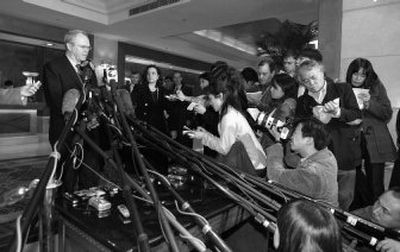Accord possible today in N. Korea talks

BEIJING – Envoys from six nations reached a tentative agreement early today on the first steps toward North Korea’s nuclear disarmament, a potential breakthrough in talks that have faltered repeatedly since 2003.
The chief U.S. negotiator, Assistant Secretary of State Christopher Hill, qualified the draft accord as “excellent” but declined to provide details. He said it was being submitted to all six governments and, pending their formal approval, would be ratified at a meeting scheduled for later today in Beijing.
“We would like to think that we can all agree on this,” Hill said at a briefing for reporters. “We feel it is an excellent draft, so I don’t think we would be the problem.”
A Chinese Foreign Ministry spokesman, Qin Gang, also suggested the tentative agreement was likely to gain formal approval by the six governments, including North Korea. He cited “extraordinarily strenuous efforts” in negotiations that lasted through the night and said the delegates would gather again later today “to confirm the progress we have made.”
Some observers expressed caution, noting that North Korea has proved unpredictable in the past and that any deal would have to be approved by the communist country’s leader, Kim Jong Il.
The tentative agreement lays out the first concrete steps that would put into practice an accord reached in September 2005, in which the Pyongyang government pledged to dismantle its entire nuclear program. According to diplomats involved in five days of arduous talks here, the opening move would be for North Korea to close down its nuclear reactor at Yongbyon and readmit international nuclear inspectors in exchange for energy aid.
In that regard, today’s accord is expected to resemble an earlier bargain with North Korea, the Agreed Framework reached in 1994 during the Clinton administration but renounced eight years later during the Bush administration. Under that deal, North Korea pledged to freeze and eventually dismantle its reactor in return for 500,000 tons a year of heavy fuel oil.
Hill declined to specify how much aid North Korea would receive in the new bargain – it had demanded large quantities of heavy fuel oil, reportedly up to 2 million tons – or to detail the schedule that would presumably tie fuel deliveries to closure of the Yongbyon reactor and subsequent steps. The Chinese-sponsored negotiations, including North and South Korea, Japan, Russia, China and the United States, had faltered for several days over what Hill had described as a North Korean effort to lock in large amounts of energy aid without binding itself to corresponding denuclearization steps.
The chief Japanese envoy, Kenichiro Sasae, said the tentative agreement was the result of compromises from all six nations, including North Korea. But he added that it was too early to say whether the government in Tokyo would give its final approval.
North Korea’s senior nuclear negotiator, Kim Gye Gwan, signaled agreement with all the draft provisions, including fuel aid, according to Chun Yung-woo, the chief South Korean delegate. But the final word had not yet come from Pyongyang, he noted.
According to diplomats’ descriptions of what was under discussion, the issue of North Korea’s existing nuclear weapons and the plutonium fuel already produced at Yongbyon would be left for later phases of what is designed as a long-term denuclearization program. U.S. experts have estimated North Korea has produced enough plutonium to make eight or 10 nuclear bombs.